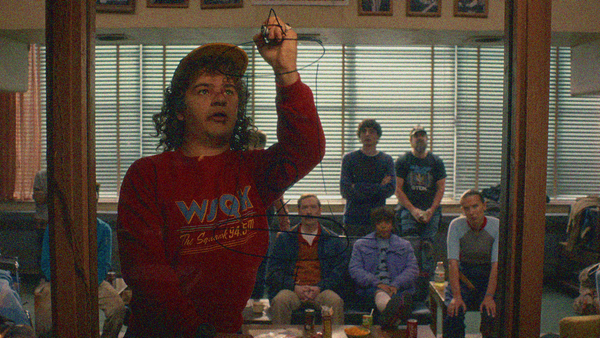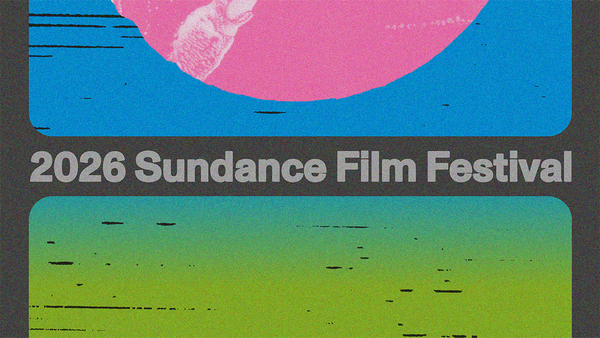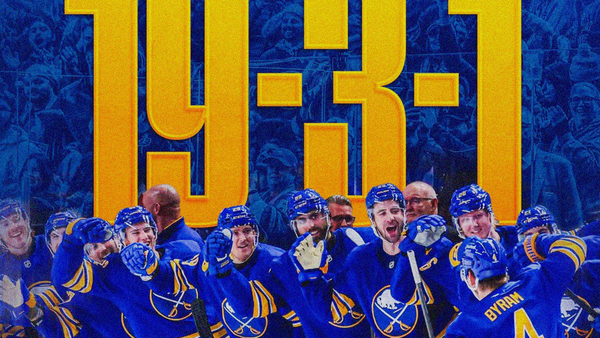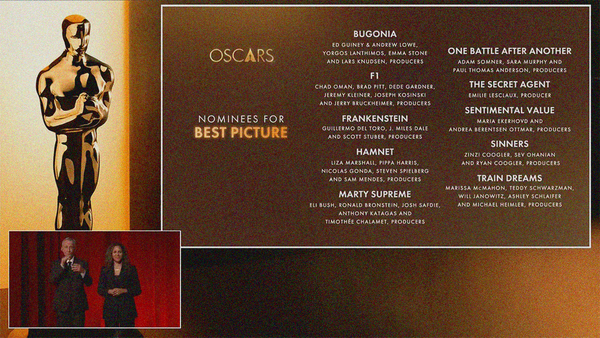Week Ending 4/11/25
Fourteen years

It’s one thing to be missing the playoffs for fourteen straight years. It’s another to miss it while two teams that were supposedly behind us on their rebuild trajectory make it instead. That’s what the Buffalo Sabres are dealing with as Ottawa clinches a spot and Montreal flirts with one courtesy of a six-game win streak.
At least Detroit still can’t get their Yzer-plan to work. So, our two fan bases can lament our consistency struggles together.
Besides the hockey (which was good with five straight wins against good teams before losing last night to Columbus), I also caught up on “Invincible” and re-watched “Hawkeye”.
I’m really enjoying Mark Grayson’s blood-soaked adventures and am fascinated to see how the whole Omni-Man and Allen the Alien team-up shakes out. The entire series has been interesting in its construction too by never truly having one story per season. It’s a lot of teasing and postponing while new or returning foes steal the limelight. You never quite know what’s coming and it keeps the action and stakes fresh.
As for Clint and Kate Bishop’s six-episode pairing goes: I still think it might be my favorite of all the MCU television shows. Concise. Connected to the movies. Funny. Just a real solid good time.
Now I only need to re-watch “She-Hulk” and “Echo” before finally diving into “Daredevil: Reborn”. I finished my Defenders marathon too soon, so why not revisit all the Kingpin/Matt Murdock appearances in the MCU during the weeks leading up to that reboot’s finale?
What I Watched:
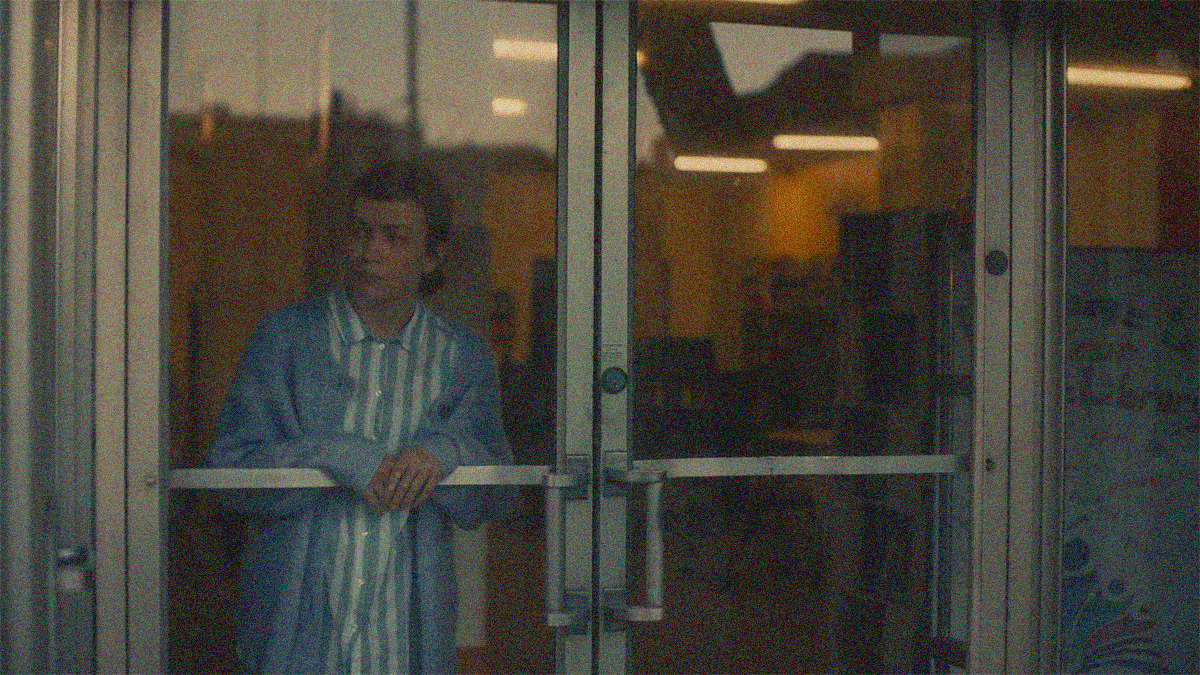
DARKEST MIRIAM
(limited release; VOD on 4/15)
Whenever a cinematic adaptation of a novel doesn't click for me, I assume it's because said adaptation comes from a place that demands familiarity with the novel. I feel this very deeply with Naomi Jaye's variation on Martha Baillie's Darkest Miriam because there does seem to be something here. I simply cannot penetrate the laborious pacing or obfuscating structure. I know it's supposed to be about Miriam (Britt Lower) coming to grips with her father's death, but it's almost impossible to reconcile that with what must occur to achieve that goal. The most integral piece to the puzzle—a romance with Janko (Tom Mercier)—is itself a manufactured mirror too fabricated for its charm to win out.
Chapter One is about introducing Miriam before eventually leading her to a moment of clarity about her loneliness. It's an odd little adventure through the eccentrics she must deal with as a public librarian that's made sinister once threatening notes apparently left for her (although their connection via Verdi's opera Rigoletto is one only she and her father would know) attempt to cloud the quirk with suspense. Rather than pursue this angle further than our quizzical hypothesis that she's leaving them for herself, however, we shift gears from goings on inside the library to goings on outside courtesy of a near injurious accident on her bicycle.
Chapter Two commences (Did my waning attention make me miss the Chapter Three interstitial or are there just two?) to portray the result of a doctor's visit wherein the attendant's intake questions force Miriam to realize she has no one else in her life. This is the impetus that gets her introvert to walk across the park during lunch and strike up a conversation with Janko. Yes, her interest in him predates the moment, but it's tough to truly understand her feelings beyond this pragmatic impulse without some internalization (presumably available in the text). We go along with the courtship and try to mine deeper alongside Janko (he tells her everything about himself while she remains closed off and silent when asked to "tell her story"), but never get anywhere.
So, when tragedy inevitably strikes to bring things full circle, I couldn't really feel anything. I became as seemingly apathetic about it all as the main character despite her tears revealing a crack in the armor. And with little left of the runtime, I hoped for some sense of closure despite fearing that none would come. Because we still don't know who wrote the letters (so I'll keep presuming she did). We still don't learn more about her father (beyond his addiction to books and dementia). We still don't even really know how she feels about what's happened. Jaye alludes to an awakening of sorts wherein Miriam allows herself an outlet through the poeticism of her "incident reports," but that's confusing too since her father was already an amateur poet.
My most interesting read of the whole is therefore that we haven't experience reality at all. Everything has been a projection of Miriam's desire to keep her father alive. She imagines him in another poet (Peter Millard's John B.). She digs out Rigoletto to fill the air. And Janko's avid reader and aspiring artist becomes an embodiment of everything she misses. We're seeing Miriam's memories of her dad through the triggers that remind her of him. Everything that happens is therefore less important than its impact upon her. Our interest in the supporting cast is only insofar as how they connect to him rather than how they exist themselves. Unfortunately, I didn't care enough about Miriam for this to fly.
So, I'm left wondering how much more of Darkest Miriam on-screen would make sense if I read Baillie's words. How much of what Jaye injects into her script with implicit visual language is the product of her knowing what each moment explicitly means, forgetting that an audience coming in cold (like me) won't be able to follow along? Or maybe the film just wasn't for me. Maybe I just didn't get it. Which is too bad because there's still a lot to like. Lower is good. Mercier is super charming. And the library's menagerie of patrons and employees supply the perfect off-kilter, straight-faced comedic energy I adore. The pieces are simply better than the whole.
- 5/10
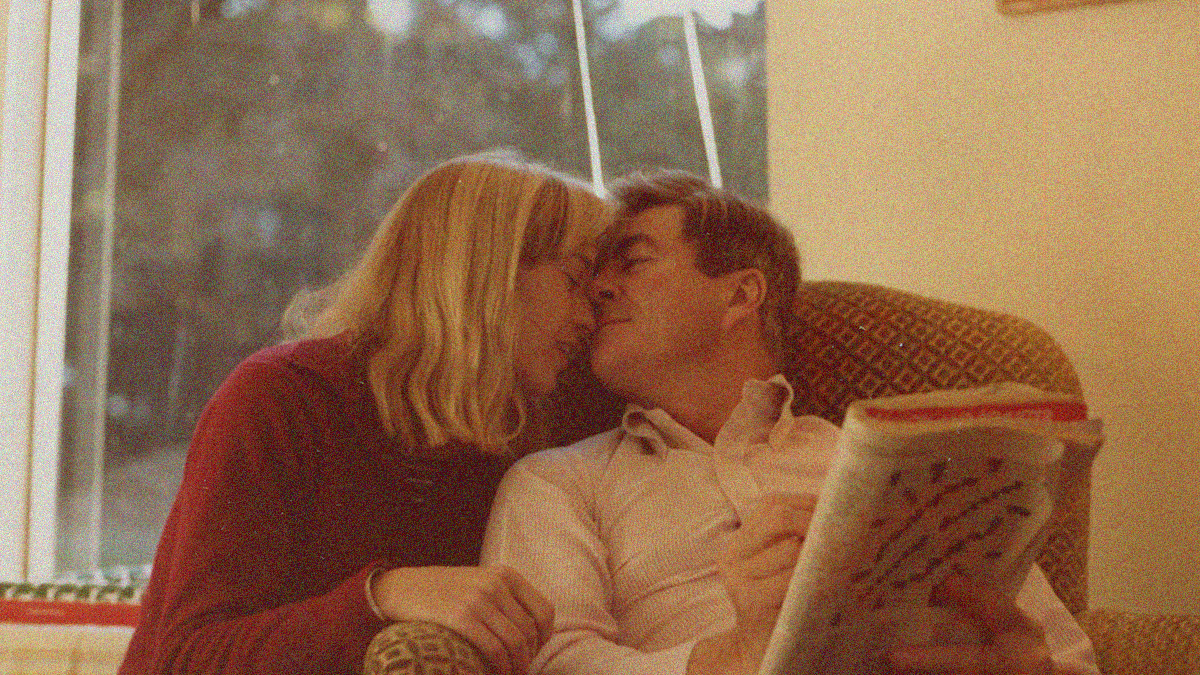
HELEN AND THE BEAR
(screening online via the Cleveland International Film Festival)
The obvious entry point into the lives of her aunt and uncle was always going to be through him. Pete McCloskey was a revered congressman from San Mateo County, California whose experiences as a Marine during the Korean War led him onto an anti-war path despite representing the Republican party. He was a renegade and activist who would eventually switch party affiliation later in life to work alongside his wife Helen helping to register minority voters towards the goal of saving democracy from the collapse we're ultimately witnessing today.
That was Alix Blair's original intent when starting the project upon moving to California and getting to know the couple better after having only seen them half a day each year as a child. Once she began digging deeper into his career arc and their relationship, however, she realized her aunt was the more interesting subject. Twenty-six years younger than Pete, she was everything his first wife (with whom he had four children) wasn't. Helen worked as his aide. She understood the politics and the job. She knew the importance of his work and was willing to stand by his side in its pursuit because she also craved the independence his absence would afford.
This fact is key to Helen and the Bear because their love isn't conventional. Not in the sense of romance or the drama that results. Helen wasn't a homewrecker as one might presume from a superficial reading of their coupling. Pete's career is what ended his marriage. And their longevity despite the age gap and living on a farm isn't the product of perfection as many would like to assume happily-ever-afters are built upon. No, they've endured an open relationship of sorts. They've leaned on friendship, mutual respect, and a nontraditional sense of loyalty uninterested in monogamy. They weathered the storm of personal tumult and public decorum to come out stronger than ever before.
What I found captivating is the luck involved to get there. Not on behalf of who Helen and Pete are/were, but that they met when they did. Because the more you hear about her adolescence self-identifying as a boy yet not feeling as though she was gay and his early career as a Republican, the two would surely have despised each other had their meeting occurred today. She would have had a better understanding of being non-binary and/or bisexual. His being a member of the Republican party would have demanded a rejection of what she stood for. So, meeting in the seventies was fate. Pete's party hadn't yet fallen so far into fearmongering that he wasn't allowed the nuance to evolve and she was still mired in notion that the private life she craved must remain separate from the public life his career demanded.
As such, we see how her sexuality might have changed his politics (if the horrors of war weren't going to be able to do so on their own). We learn about the reality that marriage as an institution mustn't strictly adhere to patriarchal gender norms to survive. That there needs to be a balance and compromise between who you are together and who you are alone—and how one shouldn't be sacrificed for the other. Helen could accept his devotion to the job and extramarital affairs because that space allowed her to focus on her own form of both. And his love for her despite those things proved to him what love was—something his own children couldn't (his daughter admits that they respected the heck out of what he stood for, but knew they'd always be a footnote in his life).
Their bond only grew as a result, reaching this inevitable moment where her sixties meant he wasn't long for this world. Rather than let that reality change who they are, though, it merely reinforces who they've always been. They still do the work signing up voters. They still get high on mushrooms together and travel in their RV with their dogs. Yes, Helen thinks about what life without him will afford her on the independence scale, but that doesn't negate the feelings of loneliness she knows will arrive once he's gone. Because no matter what they did on their own during their marriage, they still had each other to lean on and come home to. Their love was strong enough to endure the other stuff. That other stuff was never strong enough to replace their love.
You must admire the candidness that comes from these types of documentaries due to a family member holding the camera. Blair's relationship to her subjects affords access, but it's her curiosity to truly understand them that delivers what we need to invest in learning about them too. The ever-present crosscuts between identical moments captured in the past via home movie and Blair's footage in the present-day say everything about how important and consistent Helen and Pete are to each other. And the use of her diaries to serve as captions and context for new revelations and admissions adds to their shared humanity on-screen. The film exposes a truth about America through the truth of two people who shouldn't work under our current tribalistic and fractured political psyche. It proves the labels and fear being weaponized to keep us apart are just a smokescreen manufactured by hate and greed.
- 7/10
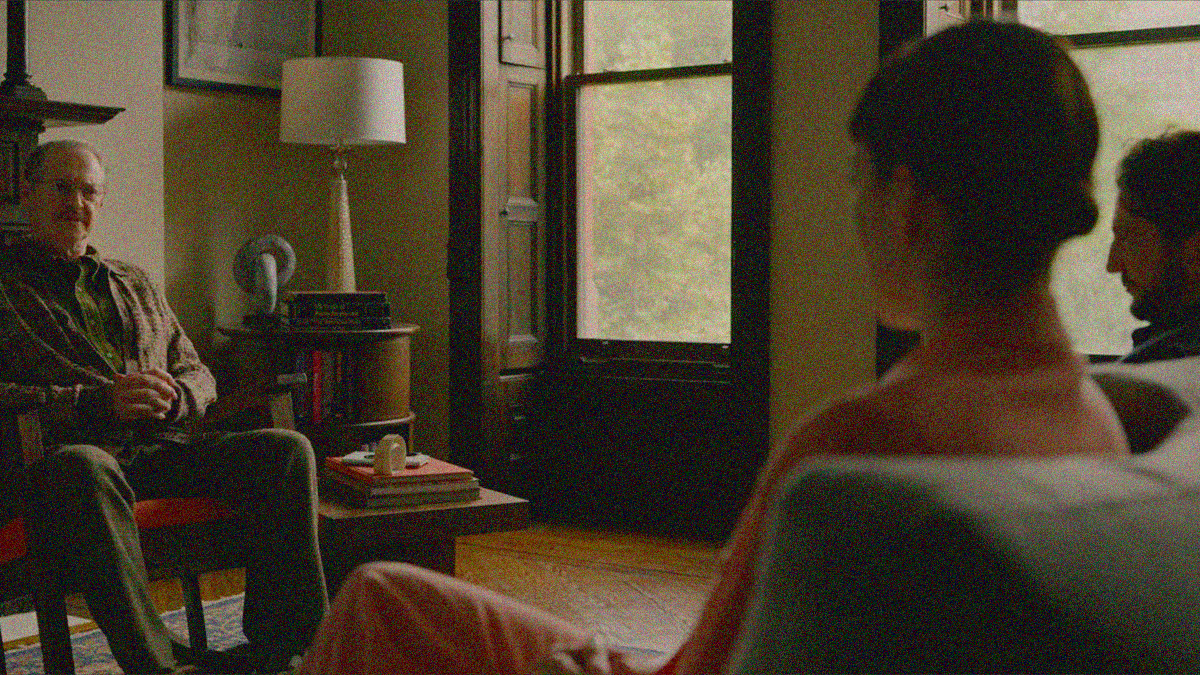
PSYCHO THERAPY
[The Shallow Tale of a Writer Who Decided to Write about a Serial Killer]
(limited release & VOD)
Despite adding the words Psycho Therapy and a colon to the title, the combination never appears during the runtime of Tolga Karaçelik's The Shallow Tale of a Writer Who Decided to Write about a Serial Killer. Used to give audiences (and surely the studio's marketing) a shorter label to describe the piece, it does prove to be a concise way to forge expectations. Because "therapy" is involved once you consider that Keane (John Magaro) and Suzie (Britt Lower) are talking about divorce. A "psycho" is too considering the person they hire to be their marriage counselor is really a retired serial killer (Steve Buscemi's Kollmick). There's just a lot of additional context necessary to bridge those words together.
It's no surprise this marriage is on the rocks. We see it via an opening dinner party wherein two couples lead Keane on with morbid curiosity more than interest as far as learning what his new book is about. He doesn't catch on and genuinely seeks to clarify the details of his 40,000BC-set Slovenian romance while Suzie looks on with stone-faced indifference and fatigue. Keane innocently seeks approval while she lays bare her frustration with his naïveté. It's not just about this long-gestating novel idea that's going nowhere, though. She's become sick of the reality that everything he does goes nowhere. So much so that she feels more mother than wife. Always making their decisions. Always paying their bills. Always keeping him alive.
And by airing this belief in order to put herself in the headspace needed to finally move on, you can't blame Suzie for reading too far into what occurs in the aftermath. She's pretty much told Keane he's an albatross and that his gravy train is leaving the station, so finding books with the titles "Toxicology" and "How to Get Away with Murder" do force her to wonder if he's planning his revenge via murder. We know this isn't the case, though, because Keane was given those books by Kollmick as research into the topic of this eccentric's former career. As a fan of the author's first novel, he felt the desire to give him the first chance at writing about the exact sort of "sexy" topic audiences crave. He'll run Keane through his entire process: stalking, killing, disposal, and survival.
Karaçelik understands the absurdity of this scenario (similar to "Based on a True Story" in many respects) and decides to really amp up that farcical nature as he pulls his characters through. First: he creates a misreading of who Kollmick is so that Keane can artificially bring him into his familial fold without raising any red flags as a "marriage counselor." Second: he fosters a misreading of Keane's true interest in murder so Suzie's paranoia can coax her into the men's "professional" relationship. Third: he lets the inevitable collision course of these misreadings to play out as off-kilter as possible. Where that leads won't astound you considering how Keane and Suzie have been presented, but it's nice to see that Kollmick's presence is a salve for both.
If nothing else, Keane agreeing to let Kollmick be the Don Quixote to his Sancho allows him the space to get out of the pedantic circles his pretentiousness has trapped him within. Is he in way over his head? Sure. That's what makes it fun for us. Magaro excels at being a raw nerve of empathy and it serves this role well opposite the equally pragmatic Suzie and Kollmick. He spirals out of control emotionally so Lower and Buscemi can calmly tell him everything is okay as long as they don't lose focus. The best moments of the film are when Suzie and Kollmick become stuck in a cycle of literalism while Keane tries to snap them out of it just as they do for him when he's overcome with crippling fear.
It culminates into an entertaining third act that wraps up the myriad plot threads from the first two. Yes, it can be a bit trying to get through the latter en route to that payoff, but I do think the former is worth your patience. Because Karaçelik must set everything up and his hands are kind of tied when dealing with Suzie and Kollmick's monotonal existences. That robotic sense of propulsion allows Keane's eventual untethering to prove fun, but it does ultimately render a good portion of the film to become monotone itself. Thankfully the ends justify the means once Karaçelik goes full speed into the metaphor that marriage is similar to murder. Or, more specifically, that the adrenaline rush of one just might be the jumpstart necessary to reinvigorate the other.
- 6/10
Cinematic F-Bombs:
This week saw House of D (2005), Limitless (2011), Scott Pilgrim vs. The World (2010), She's Having a Baby (1988), Sorcerer (1977), and Waiting for Guffman (1997) added to the archive (cinematicfbombs.com).
Aubrey Plaza dropping a series of diegetically censored f-bombs in Scott Pilgrim vs. The World.
New Releases This Week:
(Review links where applicable)
Opening Buffalo-area theaters 4/11/25 -
Akaal: The Unconquered at Regal Elmwood
The Amateur at Dipson Amherst, Flix, Capitol; AMC Maple Ridge, Market Arcade; Regal Elmwood, Transit, Galleria, Quaker
The Ballad of Wallis Island at Dipson Amherst
Drop at Dipson Flix, Capitol; AMC Maple Ridge, Market Arcade; Regal Elmwood, Transit, Galleria, Quaker
Eephus at North Park Theatre (select times)
“The result is a low key affair with small town guys being dudes. They're mostly all attempting to tell each other how much they appreciate this time together without actually saying the words.” – Full thoughts at HHYS.
Good Bad Ugly at Regal Elmwood
Holy Cow at North Park Theatre (select times)
Jaat at Regal Elmwood
Jack at Regal Elmwood
The King of Kings at Dipson Flix, Capitol; AMC Maple Ridge, Market Arcade; Regal Elmwood, Transit, Galleria, Quaker
I Know Catherine, The Log Lady at North Park Theatre (select times)
One to One: John & Yoko at Regal Transit
Warfare at Dipson Flix, Capitol; AMC Maple Ridge, Market Arcade; Regal Transit, Galleria, Quaker
Streaming from 4/11/25 -
Magpie – Hulu on 4/11
“Ridley and Latif play their parts in this pulpy thriller's machinations to perfection, so don't be embarrassed if you end up standing to cheer the satisfying result.” – Full thoughts at HHYS.
Meet the Khumalos – Netflix on 4/11
Pets – Disney+ on 4/11
Shadow of God – Shudder on 4/11
Ohio Confidential – Max on 4/15
Small Things Like These – Hulu on 4/15
Wealth of the Wicked – Max on 4/15
Now on VOD/Digital HD -
The Assessment (4/8)
“Regardless of whether THE ASSESSMENT bit off more than it could chew, I did still enjoy it. The themes are sound, if also somewhat overt. The production design is amazing. And the acting keeps us engaged throughout.” – Full thoughts at The Film Stage.
In the Lost Lands (4/8)
Magazine Dreams (4/8)
“Elijah Bynum's MAGAZINE DREAMS is a case where there are so many great things happening that are ultimately let down by execution.” – Full thoughts at HHYS.
Mickey 17 (4/8)
Novocaine (4/8)
On Becoming a Guinea Fowl (4/8)
Seven Veils (4/8)
“Jeanine is exorcising her demons by confronting her past through her art—wielding this opportunity as a weapon to ensure some culpability on [her former teacher's] part is added to the myth surrounding his acclaim with this specific opera.” – Full thoughts at HHYS.
There’s Still Tomorrow (4/8)
Universal Language (4/8)
“Rankin and company are providing us a glimpse at the beauty of our shared human experience removed from labels and geography. The true "color blindness" of society isn't achieved through homogeneity. We get there through acceptance.” – Full thoughts at jaredmobarak.com.
The World Will Tremble (4/8)
“The quick pace and fluid passing of time is the [film's] best feature because this escape becomes less about the characters than the act itself. Everything they sacrifice proves [their eye-witness account] will always be more important than their lives.” – Full thoughts at HHYS.
Eric LaRue (4/11)
“The thing about Eric LaRue is that it doesn't mine these complexities to search for answers or empathy. No, it seems more interested in stoking the hate instead. It craves provocation.” – Full thoughts at HHYS.
Mogwai: If the Stars Had a Sound (4/11)
Psycho Therapy: The Shallow Tale of a Writer Who Decided to Write About a Serial Killer (4/11)
Thoughts are above.
Relative Control (4/11)
Thanks for reading Hey, have you seen ...?! Subscribe for free to receive new posts and support my work.

